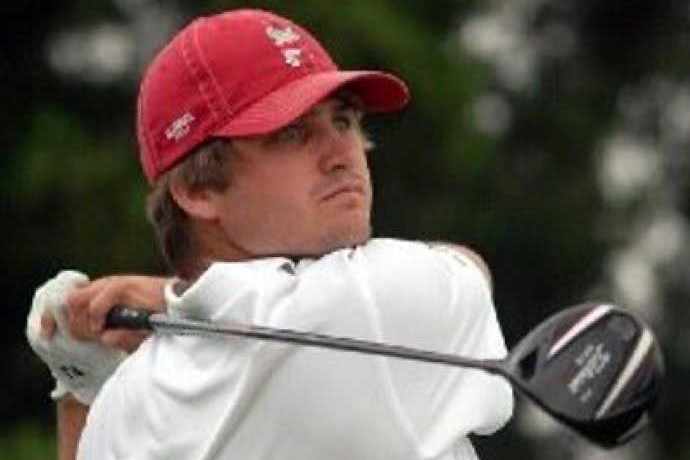People Still Talk About his 14-under Round
Ten years later, a lot has changed for Bobby Wyatt. He’s no longer playing golf professionally, and he’s married and the father of a seven-month-old daughter who rules his world. He’s living and working in Atlanta and says he’s as happy as he has ever been.
But one thing hasn’t changed — to many who follow the game of golf, and followed Wyatt’s career as a nationally ranked junior player and All-America at Alabama where he helped the Crimson Tide claim two national championships — he’ll always be Mr. 57.
The reference is to July 28, 2010, when, playing on his home course at the Country Club of Mobile in the Alabama Boys Junior Championship, Wyatt had the round of his life, shooting a 9-under-par 26 on the front nine and finishing with a 14-under scorecard of 57 on the par-71 layout. It is a round that is still talked about today, and one Wyatt himself certainly will never forget, though he admits there are parts of the day that are fuzzy.
The anniversary of the 57 caught him a bit by surprise when asked to recall the day and noted there were some shots he didn’t remember. But as he began describing the day, the shots and all those putts that fell for him that day, became a bit clearer in his memory, and the excitement he felt that day — but rarely showed, as was his demeanor on the course — came through once again.
“I am,’’ Wyatt said when asked if he is still asked about the round of 57.
“A lot of times it’s in jest because I think a lot of people know I laugh about it. People who I play golf with for the first time might jab at me with a Mr. 57 type thing,’ he said. “But I don’t get asked about the actual day very often.’’
Bobby Wyatt: The Round
It was quite the day. The quick version is that he began by draining a 20-foot birdie putt on the first hole, then made birdie again on the second hole. A par at No. 3 was followed by three straight birdies, an eagle on the par-5 7th, and birdies at No. 8 and No. 9 for a 9-under score of 26. He headed to the back nine where he birdied No. 10 and No. 11 to go 11-under over 11 holes. A par at 12 was followed by a birdie at 13. Pars on 14 and 15 were followed by birdies at 16 and 17 and a par on the 18th hole for a back nine round of 31 and an 18-hole score of 57.
The Golf Channel broadcast news of Bobby Wyatt’s feat and word spread quickly across the country about his performance. While some wondered aloud if the score was a reflection of an easy set-up on a short course, PGA Tour player Stewart Cink, who played the Country Club of Mobile many times as a junior, assured doubters as to the validity of Wyatt’s accomplishment.
“C.C. of Mobile is a course I know well,’’ Cink noted on his Twitter account soon after Wyatt’s story broke. “One of my favorites. Not a pushover by any stretch of the imagination.”
The score propelled Wyatt to a fourth straight boys state championship and more than a few stories among his friends.
It was ‘All Kind of a Blur’
“It was so cool that it was at the Country Club of Mobile,’’ Bobby Wyatt said. “That was probably a large part of it ever happening. I knew those greens so well. I grew up on those greens and I knew exactly what every putt did, and it was so cool that it was at home and it happened in front of my mom and dad and so many family and friends. It’s kind of a blur still when I look back on it.
“Us golfers have crazy memories, and you remember every shot and yardages on shots you would never think you’d remember. But I only remember a few from that day. I remember a lot of the putts and a couple of shots on the back nine, but for the most part it’s all kind of a blur. It became so much a bigger part of my golf career than I ever thought it would have. It was just a lot of fun and a great memory to look back on.’’
Wyatt was in a threesome with Trey Mullinax and Michael Johnson, who he described as “great friends who are still great friends, both of them professional golfers and doing well.’’
In reality, his first round of the tournament hadn’t gone as well as he had hoped — a 3-under 68.
“I had really kind of been struggling. I don’t know if it was I was excited about college golf and getting to school and I was a little distracted, looking ahead at the next thing and taking my eye off the ball a little bit. But I really didn’t play that great that summer.
“I was frustrated about it and I didn’t play well in the first round and with it being my home course I expected to do better than that. For the most part, I was a big practice person after a round; I would go and grind it out. But for whatever reason — I was frustrated because I didn’t play that great and I didn’t do anything, I just went home. I remember having a quick little session on the range the next morning.’’
His frustration would quickly dissipate.
Bobby Wyatt Was a Putting Machine
“On the first hole I made a 20-footer for birdie and then on the second hole I hit a good shot and made about a 10-footer. I parred the third and then hit it close on four and five and made another birdie on six, then I hit it to about three feet for an eagle on seven.
“The next thing I knew, I was 7-under after seven. It’s a course I’d played a thousand times. That’s when it started feeling strange and when I started thinking about (shooting in the 50s). I just putted so well. I hit it fine — I hit to 10 or 15 feet all day — and I just made all the putts. It was just one of those days. I didn’t know that anything special was happening until seven, and then I made another birdie on eight and at nine as well.’’
If he wasn’t aware of what was going on, those following him certainly did, and they let him know as he made the walk from the ninth green to the No. 10 tee box to begin play on the back nine.
“I realized I had just shot nine under (on the front nine),’’ he said. “I remember walking over to the 10th tee and people were talking to me and saying, ‘You just shot nine under,’ so I had to try and collect myself and refocus because I had never done anything like that in my life.’’
His playing partners kept things light and, Wyatt said, became his biggest cheerleaders along the way.
“Trey and Michael laughed about it,’’ Wyatt said. “Trey kept telling me throughout the day that we had a bet with somebody. I said, ‘Great.’ It was his way of trying to make sure I kept my focus and kept making birdies. As it turned out, that was a huge lie, we didn’t have a bet with anybody. It was just Trey’s way of trying to keep me going. … I really only made one long putt that day, a 40-footer on No. 11, and they were making hand motions or something like that as to whether I was going to make it or not. They laughed about it. Trey and I ended up living together all four years at college, so when I look back on it, it was great that they were part of it.’’
Walking Off No. 9 at 9-under
After birdies on 10 and 11 and a par on 12, Wyatt approached the par-5 13th hole and he placed his tee shot in a fairway bunker on the right side. “I remember that shot well. For some reason I was in a funk where I had been hitting it in that bunker a lot,’’ he said. “It was a well-placed bunker from that back tee and I think I hit it in there again in the third round as well.’’
Many expected Wyatt would have to simply punch out of the bunker. But that wasn’t the case. “I thought, ‘Well, you’re 11 under, and if you hit it in the hazard and drop you might make par, bogey at worst, so why not go for it?’ … I hit a hybrid out of there and hit a really good shot and had an eagle putt from 20 feet and I just left it short and made birdie. I didn’t think I remembered these shots but I’m starting to remember them again. … That was the first time I realized I was really, really nervous. That’s when it really started to hit home, that if I keep it up I had a chance to shoot in the 50s.’’
At 15 Bobby Wyatt hit his tee shot way right and was forced to lay up but he still managed to par the hole. He followed that with two more birdies, then headed to 18, where he laced his tee shot right in the middle of the fairway and hit an approach shot within the 10-15-foot range as he had done all day.
“I hit (the putt) right where I wanted to but it was the only time (that day) I misread the green and I totally misread the putt. I hit it right where I wanted to, but it just slid by because I misread the putt,’’ Wyatt said.
“At that point I was calm and I was pretty confident. I saved myself on 13 and after hitting it way right on 15 I was still able to make par and then I birdied 16 and 17. I overcame that period of time where I was missing shots but I was still scoring well. For whatever reason, that calmed me down. I hit a great tee shot on 18 and hit up there close, I just missed the putt.
“That’s when things started to get blurry. I don’t really remember thinking there are a bunch of people watching and there was a bunch of media around. I was pretty focused,” he said.
‘I Didn’t Want That to be My Legacy’
“I think I enjoy it more now that I have moved on from competitive golf. As I was playing, I always kind of pushed it to the side. I didn’t necessarily want one round to define my career. That’s not what I wanted to be known for. I wanted to accomplish much more than just that. Anybody can get hot on a given day and I didn’t want that to be my legacy.
“A lot of times I tried to push it down. But looking back, I was 17 at the time, on my home course and my last tournament as a junior in an event I really, really loved playing so much. When I was 10 years old I lost in a playoff … and since then I just fell in love with the event. It was my major every year. It was at my home course — it is a cool thing.’’
An Outstanding Amateur Career
Wyatt went on to many accomplishments on the golf course. He was a two-time All-America pick in helping Alabama win two NCAA championships. He won the prestigious Sunnehanna Amateur title in 2012 and led the U.S. team to the Walker Cup title in 2013, leading all golfers by scoring 3.5 points in the Ryder Cup-like event.
In 2012 he was medalist at the U.S. Amateur and advanced to the round of 16 where he lost to another University of Alabama golfer, Justin Thomas.
Bobby Wyatt’s Life After Golf
After his college career he stepped into professional golf, but he struggled a bit with his game. He had some good moments, but not as many as he would have liked.
His best round in a PGA Tour event was a 64 in the Zurich Classic of New Orleans where he finished tied for fourth and one shot out of reaching a playoff. But the grind of professional golf eventually wore Wyatt down.
“When I struggled as a professional, sometimes that was difficult to see people that were my peers for so long have so much success,’’ he said. “But it’s so cool to watch them play so well and it’s fun to cheer them on. I do (keep in touch with them) a good bit. You spend so much time on the road, whether it’s junior golf or college golf or being on Tour, so I definitely keep up with a lot of them.
“It is what it is. Unfortunately, I struggled with my game, but in reality I think I was done with the game. I deep down believe that. You could have handed me a PGA Tour card by the end of it and I wouldn’t have taken it. I wasn’t enjoying it, I wasn’t enjoying the game, wasn’t enjoying the lifestyle. It was becoming more of a job and it was more taxing than I ever thought it would be. I made the decision to move on and it’s been great for me and my family.’’
Still Plays, But His Daughter is His World Now
Today, he and his wife Jean live in Atlanta with their daughter Finlay, who Wyatt says, “is just my world now. She’s awesome. My wife and I moved here about a year and a half ago. I work at Goldman Sachs in the private wealth management division. I couldn’t be more fortunate than to be with such a great company and firm. We’re loving it.
“I still play a good bit, or try to anyway. I’ve probably played more in the last two months than I have in a long time. For the most part, I still love it. I have found myself become more of a fan of the game than I ever have been. I watch golf on the weekends when I can and there are so many people there that I love and have good relationships with that I care about and it’s great that they are having so much success.’’
But he has something his friends now playing on the PGA Tour don’t have; he has a round of 57 — 14 under par — in a competitive round.
“I hope so; it would make me feel good if that was the case,’’ Wyatt said when told of the excitement that everyone seemed to experience that day 10 years ago when he shot a 57. “I remember having a few good friends there who were very excited.
“The state junior was always such a big deal to me. I played every year and there were some national tournaments that were available to me (played at the same time), but my parents did such a great job, I’m so thankful for them; it was important to play in your state tournament and support the (Alabama) Golf Association, but also how are you going to be the best player in the country if you’re not the best player in the state? That’s how I always looked at it and it was my biggest tournament. I felt that I had to defend it.
“It was great that it was at the Country Club of Mobile my last year (as a junior player). It was just really neat that everything came together for me.’’
Tommy Hick is an Alabama Golf News contributor
Have a story idea or a news item to report? Email bamagolfnews@gmail.com.
Featured image: Alabama Golf Association











